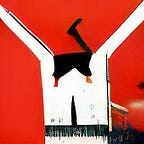Disenfranchise The Old
One of the most popular silence-fillers you’ll hear parroted around this country is “no-one’s got any respect for the old anymore”. We’re told of a golden age when youngsters sat in mute deference as Grandpa rambled on about that one time he gutted an entire family of w*gs. When grown up children ignored their own needs, and dropped everything to ensure Nana had a nice little place to plonk her leathery layers. A time and place where it was unheard of — nay, unthinkable — for anyone to board a plane, train or automobile before those born in the early days of tarmac. And — O — the tinned meat, weren’t it great?
It’s gone to the dogs now though, innit? Now, all about, the young’uns do nothing but blaspheme and collectively chuck Tradition and its living embodiments on the trash heap. Not like how it were before.
If only this were true.
If it was — that those wonderful years in senior-citizen husbandry really have just disappeared in the rear-view mirror, then they certainly would have been exceptional. Throughout human history the grey-tops have mostly been seen as deadweights. A great many folk monsters — witches, hags, crones — of the Middle Ages can be explained as anxieties relating to old age. “There’s an elderly woman, she’s wizened, likes cats, gives the children a fright (and there’s no Jews around to point the pitchfork at) — but most importantly, she sits there, living off the fruits of my labour. We should get rid.” And when famine and disease hit, a great many feudal villages did just that, ridding themselves of their feckless old.
(An ungallant commentator might add that when Inuit food stores dwindled, at least their elders took the initiative and faded into the Wastes.)
The early decades of the Industrial Age weren’t much different (that is, of course, if you weren’t a member of the emerging bourgeoisie or crumbling aristocracy). An immediate effect of the Industrial Revolution, as in with all revolutions, was a dip in life expectancy — but reaching new lows here. To bring in a bit of focus here: homo decrepitus was a dying breed in the West.
That was until socialists, Chartists and Fabians began forcing through the foundations of the welfare state. Only then did we see some sort of state compensation for those who had quite literally broken their backs in the service of Progress (or should that be “tentative reform”?). Since this time, as sociologists have pointed out, Britain has only become more attentive to the extremes of age, the very young and the wizened old.
With every generation this trend has only gained more substance: pensions are now the biggest government expenditure on welfare, and one of the largest overall. This is a dramatic turn-around. They were no longer treated as a nuisance dependent.
On top of the £92 billion a year spent on pensions, governments of a mostly red bent have added the winter fuel allowance, nurses, free care and world-class medical treatment. And before attaining new hips, our current elderly could expect government-subsidised further education, a more equitable economy and real wage growth — but that’s a different story. (What’s more, it’s those hated immigrants who are, in large part, ensuring these tributes from young to old keep going.)
They’ve never had it so good! And, while we’re at it: those ungrateful bastards!
How have they responded to the internationalist labour movement that coddled them so? By becoming insular, ignorant and bitter. In a word, Tory. Little to no acknowledgement of names like Atlee and Bevan, which made this historically-anomalously state of things orthodoxy.
I’m no Maoist, but the Chairman did acknowledge a struggle and solidarity too often overlooked: the generational. And it is about time that we, the so-called “lost generation”, recognise our shared interests and, indeed, enemies. From Brexit and 2019’s General Election, to the existential crises that transcend politics, we are almost entirely opposed to them.
Our generation — the under 35s — can not look to the past for a guide to the future, because no ancestor, alive or dead, can help humanity properly confront the two great challenges of this epoch: nuclear proliferation and global warming. (Both exacerbated by the sort of people who now wish to claim respect for who they are rather than what they do.)
I can almost hear the creaky tones of the opposition: well why don’t your lot get out and vote if you don’t like it so much? Because for so long our political system has been kept under the wrinkled grip of the unimaginative and corrupted. And as a result, many have turned away from the whole farce in despair. But if we were to put a ban on all those unlikely to survive through the brunt of their bad decisions, younger voices could be heard. And then maybe, just maybe, we may find a way out of this mire.
So, just as one can be too young to understand what it takes to tackle the great problems facing society (the English have arbitrarily decided it’s anyone under 18), can’t someone be too beaten down by cynicism and senility to be taken seriously? I would say so, which is to say: Yes! — I SAID YES.
